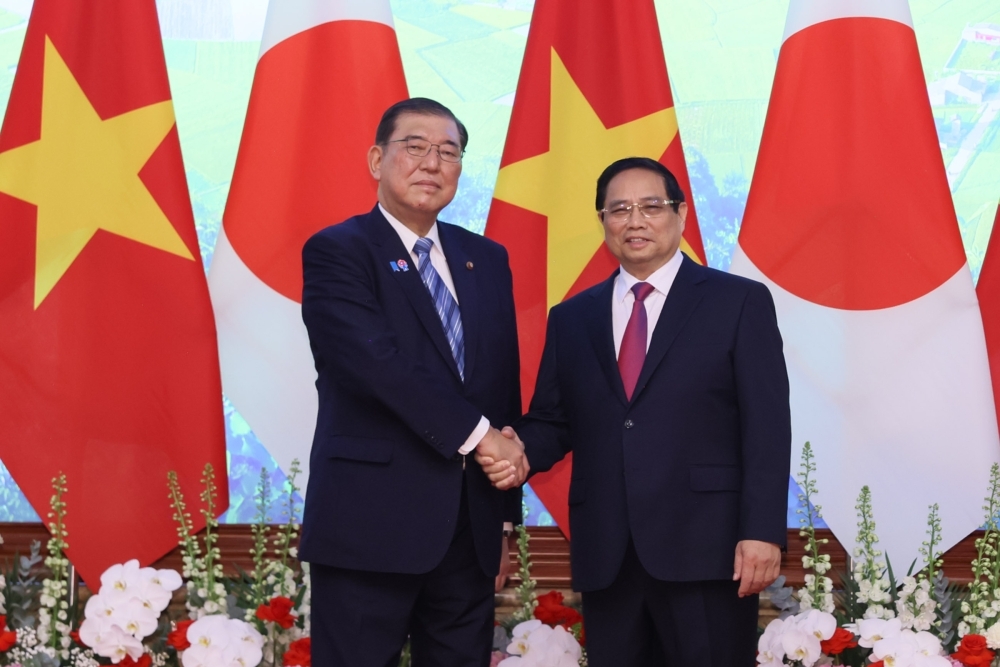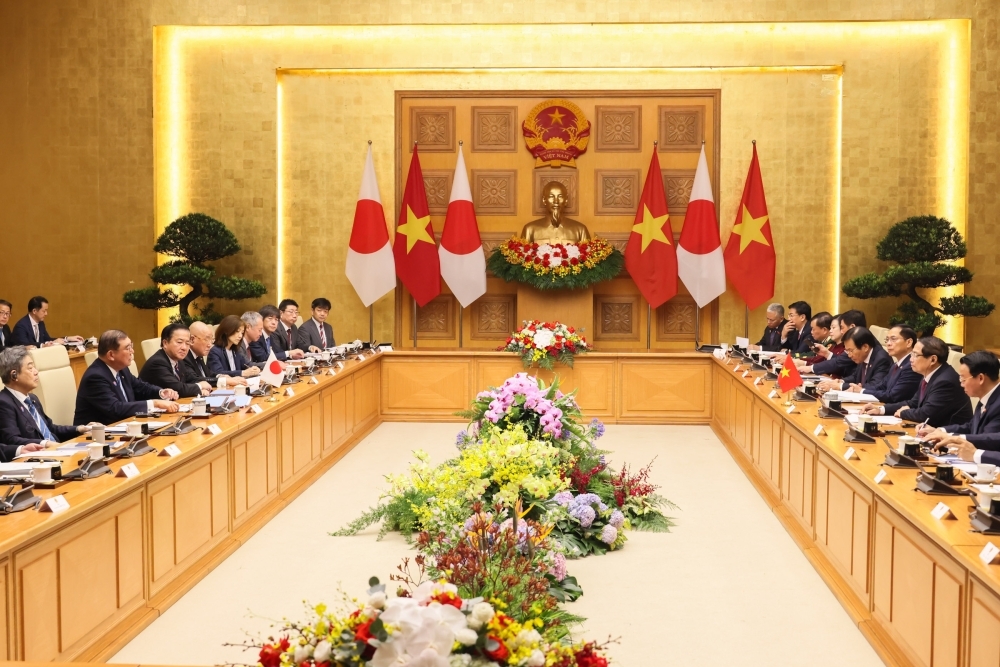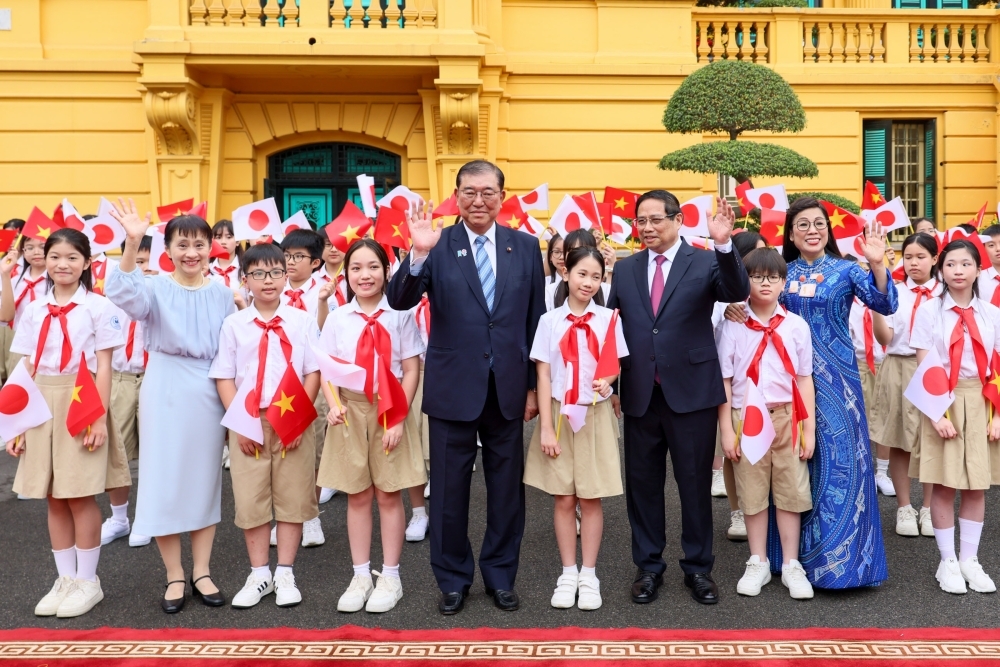Japan-Viet Nam Relations
Japan-Viet Nam Summit Meeting
 (Photo: Cabinet Public Affairs Office)
(Photo: Cabinet Public Affairs Office)
 (Photo: Cabinet Public Affairs Office)
(Photo: Cabinet Public Affairs Office)
 (Photo: Cabinet Public Affairs Office)
(Photo: Cabinet Public Affairs Office)
On April 28, 2025, commencing at 8:50 a.m. (local time;10:50 AM, JST) for approximately 110 minutes, Mr. ISHIBA Shigeru, Prime Minister of Japan, held a summit meeting with H.E. Mr. PHAM Minh Chinh, Prime Minister of the Socialist Republic of Viet Nam at the Prime Minister’s office during his visit to the Socialist Republic of Viet Nam. The overview of the meeting is as follows. Prior to the meeting, Prime Minister Ishiba laid a wreath at the Monument to Heroic Martyrs and the Ho Chi Minh Mausoleum. This was followed by a welcome ceremony hosted by Prime Minister Chinh. After the meeting, the two leaders held a document exchange ceremony and a joint press conference, and issued a joint press release.
1. Introduction
Prime Minister Chinh welcomed Prime Minister Ishiba's visit and he stated that it is a pleasure to see the development of Japan-Vietnam relations in various fields. He conveyed his intention to closely cooperate with Prime Minister Ishiba in further strengthening the bilateral relations and in responding to regional and international issues based on the “Comprehensive Strategic Partnership”. Prime minister Chinh also expressed his congratulations on the successful hosting of the Osaka-Kansai Expo.” Prime Minister Ishiba expressed his heartfelt gratitude for the warm hospitality extended during his visit and emphasized Japan's commitment to maintaining and strengthening a free and open international order based on the rule of law and a multilateral free trade system. He reaffirmed Japan's position as Vietnam's irreplaceable partner in the "new era." He further stated that strengthening relations with the rapidly growing Viet Nam would contribute to the stability and prosperity of both countries and the region, and expressed a desire to upgrade Japan-Vietnam cooperation.
2. Bilateral relations
(1) Security
The two leaders welcomed the progress in cooperation, such as the completion of the transfer of transport vehicles to the Vietnam People's Army and the port call by escort vessels JS Suzunami to Da Nang. They agreed to establish a vice-ministerial-level Foreign and Defense Policy Dialogue (2+2) to strengthen strategic communication. They also discussed the importance of specific cooperation such as the transfer of defense equipment and technology, as well as OSA.
(2) Economy
Prime Minister Ishiba welcomed the direction of the “New Era” set forth by Secretary General To Lam, and the two leaders shared recognition that Vietnam’s economic growth is important for the development of the entire region.
A. The two leaders had a broad discussion on economic issues, taking into account the impact of the U.S. tariff measures and China's retaliatory actions on the global economy and the multilateral trading system. Prime Minister Ishiba emphasized the importance of listening to the voices of Japanese companies affected by the current situation and maintaining close communication with Vietnam. The two leaders agreed on the importance of achieving industrial advancement to enhance Vietnam's resilience to external shocks amid increasing global economic uncertainty. Prime Minister Ishiba stated that Japan would accept about half of the 500 postgraduate students that Vietnam aims to train in the semiconductor field, and that a semiconductor program would be launched at the Japan-Vietnam University, a symbolic project of Japan-Vietnam cooperation.
B. Regarding GX and energy, Prime Minister Ishiba stated that Japan would cooperate to promote projects with a total value of approximately $20 billion, including offshore wind power, interconnection line development, biomass, and support from Japan Bank for International Cooperation (JBIC), as Japan-Vietnam cooperation projects centered on the Asia Zero Emission Community (AZEC). The two leaders agreed that Japan and Vietnam would lead Asia's energy transition.
C. Regarding the improvement of Vietnam's investment and economic cooperation environment, Prime Minister Ishiba expressed his expectations for Prime Minister Chinh's leadership, and the two leaders agreed to strengthen cooperation to resolve issues faced by Japanese companies, including LNG operators. Japan will continue to support Japanese companies' investment and business expansion in Viet Nam through JBIC loans and METI programs and will also encourage further strengthening of relations with the OECD.
D. Regarding disaster prevention and agriculture, Prime Minister Ishiba stated that Japan would contribute to strengthening Vietnam's resilience and reducing disparities through support for disaster prevention infrastructure development and food security in the northern mountainous region. Prime Minister Chinh expressed his gratitude.
(3) People-to-people exchanges
The two leaders confirmed the importance of exchanges at the high-level, between political parties, between parliaments, and at the grassroots level. Noting that the number of Vietnamese residents in Japan has surpassed 600,000, they reaffirmed to further promote people-to-people exchanges between Japan and Vietnam by leveraging opportunities such as the Osaka-Kansai Expo and GREEN×EXPO 2027.
3 Response to regional and international issues
Prime Minister Ishiba stated that Vietnam is a key partner in realizing a free and open Indo-Pacific based on the rule of law. The two leaders exchanged views on a wide range of issues and agreed to continue close cooperation.
(1) Situation in the East China Sea and South China Sea
The two leaders exchanged views on the situation in the East China Sea and South China Sea and confirmed that they would continue to cooperate closely.
(2) Situation in North Korea
The two leaders exchanged views on the situation in North Korea, including the North Korea’s nuclear and missile activities, and reaffirmed the importance of the immediate resolution of the abductions issue.
(3) Others
The two leaders exchanged views on responding to various issues, including the situations in Ukraine and Myanmar, as well as on cooperating in various frameworks such as Japan-ASEAN, Mekong-Japan and the United Nations.


